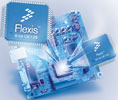

Said to break new ground in 8- and 32-bit compatibility, Freescale has introduced the first two members of its new Flexis series of microcontrollers (MCUs). The MC9S08QE128 based on the S08 core, and MCF51QE128 based on the ColdFire V1 core, are claimed to be the industry’s first 8- and 32-bit MCUs with pin-for-pin compatibility and a common set of on-chip peripherals and development tools.
The Flexis series provides the 8- to 32-bit 'connection point' on Freescale's Controller Continuum - a roadmap for compatible 8- and 32-bit architectures. The Flexis QE128 family is said to enable developers to migrate between low-end and high-performance embedded designs with ease, speed, cost-effectiveness and ultra-low-power operating efficiency.
By providing a clear migration path, the Flexis QE128 MCUs open up a wide range of possibilities in a variety of consumer and industrial applications, including health care instrumentation and monitoring, factory automation, point-of-sale equipment, fire and security systems, HVAC and building control, metering and consumer appliances. The compatible architectures and tools make it easy to expand into new embedded markets without having to invest heavily in software rewrites and conversion to a new architecture.
Exceptional compatibility
Freescale's Controller Continuum provides great flexibility to transition between 8-bit and 32-bit performance. With pin, peripheral and tool compatibility, the Flexis QE128 devices offer a simple migration path for customers designing a wide range of products.
For example, a developer can leverage the same board design, software code and development tools to scale up a simple 8-bit residential security control system to a sophisticated 32-bit commercial security control system, or a basic home blood pressure monitor to an advanced hospital blood pressure monitor. Instead of starting over to create a low- or high-end version of a design, the developer simply switches out the pin-compatible 8- or 32-bit Flexis MCU and recompiles the code using the same CodeWarrior Development Studio software.
Ultra-low power
As consumer and industrial devices become smaller, portable and more sophisticated, enhanced power efficiency and extended battery life have become application-critical requirements. The Flexis QE128 devices are designed to meet these requirements through optimised peripherals that enable lower operating voltage and current.
The MC9S08QE128 and MCF51QE128 can run off an external 32 kHz oscillator that consumes less than 1 μA of current. The Flexis QE devices also have an internal voltage regulator, which helps enable fast wake up from stop modes with a typical wake-up time of 6 μs. Stop modes for the Flexis QE128 devices consume 370 nA of current in the lowest power mode. Clock gating can also be used to disable clocks to unused modules, further reducing run-mode power consumption by as much as 33%.
Easy to use
Freescale has simplified migration between 8- and 32-bit to a quick, easy MCU swap. Using a common integrated tool suite, developers do not have to learn new code and tools.
Freescale's CodeWarrior Development Studio for Microcontrollers 6.0 provides an array of built-in features and utilities to help developers deliver higher-quality products to market faster. For example, the Processor Expert rapid application design tool included in the CodeWarrior tool suite helps simplify the migration process between other Freescale MCUs.
To ease board design, Freescale offers the full-featured EVBQE128 evaluation board, the cost-effective DEMOQE128 demonstration board, and an extensive library of reference designs and application notes. Virtual labs and webcasts are also available to help developers learn how to design with the Flexis QE128 devices.
For more information contact Future Electronics, +27 (0)31 262 7743.
| Tel: | +27 21 421 8292 |
| Email: | [email protected] |
| www: | www.futureelectronics.com |
| Articles: | More information and articles about Future Electronics |
© Technews Publishing (Pty) Ltd | All Rights Reserved